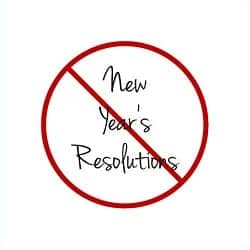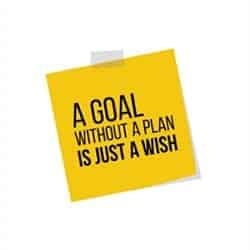It is said that the definition of “insanity” is doing the same thing over and over again expecting different results, yet with the best of intentions many of us make a New Year’s Resolution each January 1st saying “this will be the year“! The problem is, that by the end of the first week in January 50% of us will have already given up on our resolution to lose weight, exercise more or eat healthier[1]. By the end of the month, 83% have given up[1]. In fact, a study on New Year’s Resolutions found that only 8% of those that make these types of health-related commitments will actually achieve them[1], which are pretty discouraging statistics.
 If we want to lose weight, get in shape and start eating healthier the way NOT to do it is by making a New Year’s Resolution.
If we want to lose weight, get in shape and start eating healthier the way NOT to do it is by making a New Year’s Resolution.
We need a plan; a plan that is specific, with outcomes that are measurable and achievable and that are relevant to our overall life goals and realistic, and we need them to be accomplished in a timely manner. These are the essence of SMART goals! You can read more about those here.
New Year’s Resolutions; a desire without a commitment
Saying “I’m going to lose weight this year” says nothing about how much weight, in what period of time, by what means, nor what “success looks like”. It’s not a goal, but a wish. It’s expressing a desire without a commitment. This also applies to exercising more or eating healthier.
How convincing would it be to us if someone said “I want to spend the rest of my life with you” but made no commitment to a relationship, or to live in the same city as us or to spending time with us? Why should we put confidence in our ourselves when we also express desires without commitment?
 We may WANT to lose weight, we may WANT to exercise more and WANT to eat healthier but all the “wanting” in the world won’t move us closer to any of those goals because a goal without a plan is just a wish.
We may WANT to lose weight, we may WANT to exercise more and WANT to eat healthier but all the “wanting” in the world won’t move us closer to any of those goals because a goal without a plan is just a wish.
…and a goal without a plan is a New Year’s resolution.
If you want to lose weight, exercise more and eat healthier this year, then what I’d recommend is rather than making a New Year’s resolution this year, make a commitment to yourself to take the month of January to design an implementable plan built on SMART goals.
If you do this, by the end of the month when 83% of people that have made New Year’s Resolutions have already given up, you will be ready to begin implement a well thought out plan! When most people have forgotten their wish, you will have what you need to be successful.
If you would like help setting SMART health and nutrition goals for yourself, I offer a one-hour session that is especially for this purpose that is available via Skype or telephone. I’ll help you set goals for yourself that are specific, measurable, achievable, relevant /realistic and timely. These will be your goals and success will look like however you decide to measure it. I will assist as a coach helping you set goals for yourself that are achievable, relevant and that can be achieved in a realistic amount of time.
More Info
If you would like more information, you can learn about me here.
To your good health!
Joy
You can follow me on:
Twitter: https://twitter.com/jyerdile
Facebook: https://www.facebook.com/BetterByDesignNutrition/
Copyright ©2018 BetterByDesign Nutrition Ltd.
LEGAL NOTICE: The contents of this blog, including text, images and cited statistics as well as all other material contained here (the ”content”) are for information purposes only. The content is not intended to be a substitute for professional advice, medical diagnosis and/or treatment and is not suitable for self-administration without the knowledge of your physician and regular monitoring by your physician. Do not disregard medical advice and always consult your physician with any questions you may have regarding a medical condition or before implementing anything you have read or heard in our content.
References
- Norcross, JC et al, Auld lang syne: success predictors, change processes, and self-reported outcomes of New Year’s resolvers and nonresolvers. J Clin Psychol. 2002 Apr;58(4):397-405

Joy is a Registered Dietitian Nutritionist and owner of BetterByDesign Nutrition Ltd. She has a postgraduate degree in Human Nutrition, is a published mental health nutrition researcher, and has been supporting clients’ needs since 2008. Joy is licensed in BC, Alberta, and Ontario, and her areas of expertise range from routine health, chronic disease management, and digestive health to therapeutic diets. Joy is passionate about helping people feel better and believes that Nutrition is BetterByDesign©.
